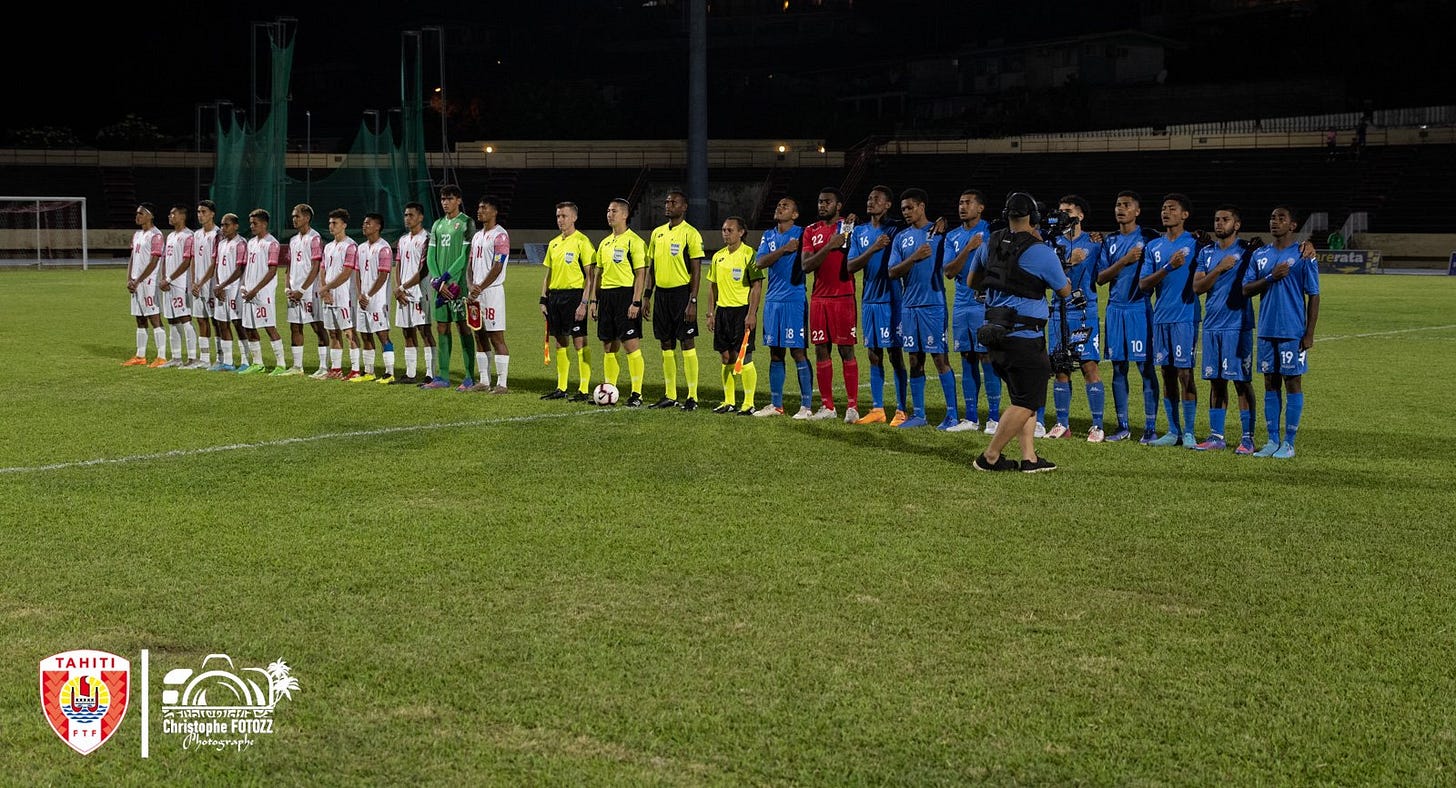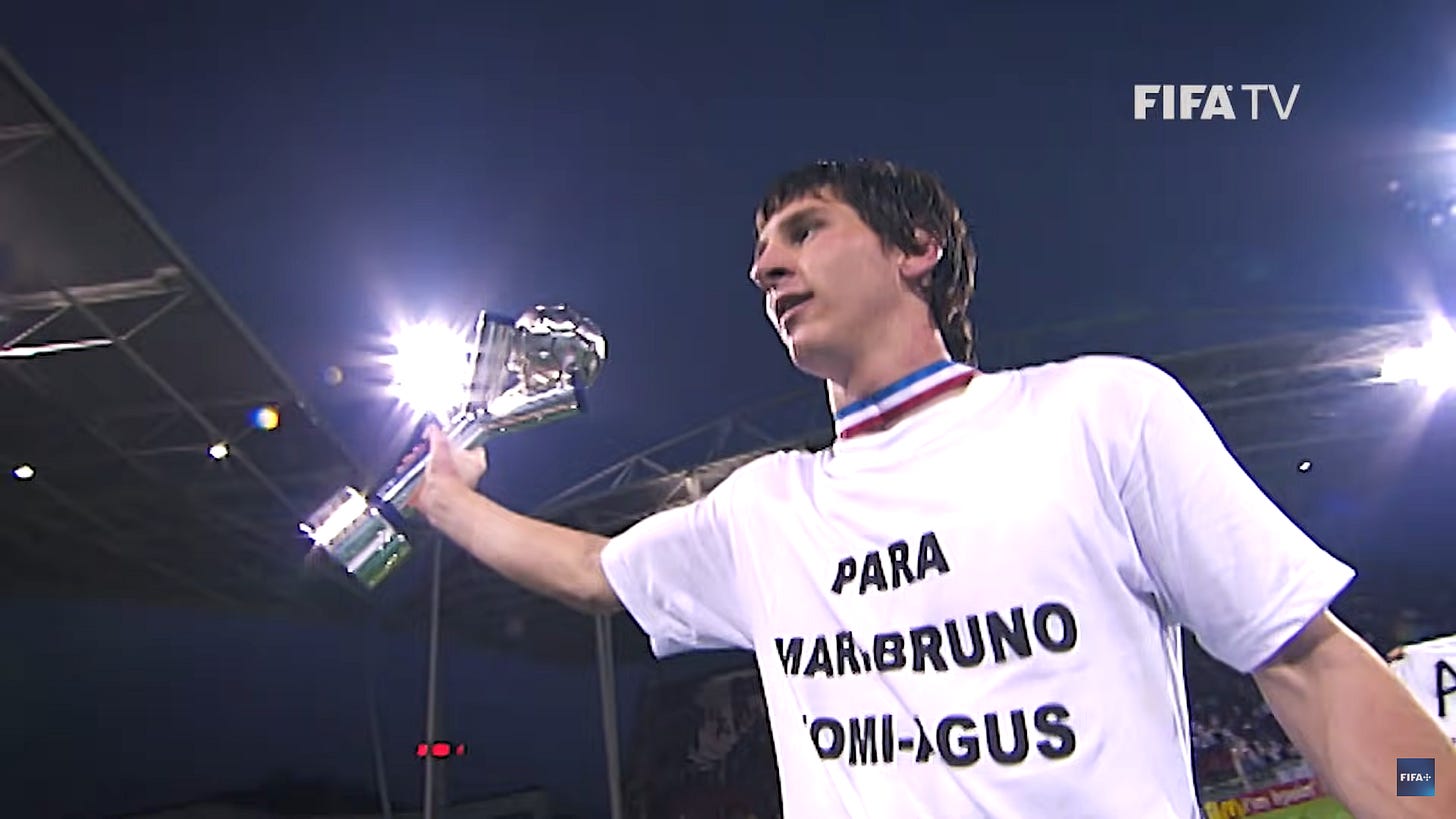How Fiji and Tahiti tried their best to lose in hope of reaching the FIFA U-20 World Cup
Tahiti's coach called it "shameful" as both sides did everything in their power not to win a game in hopes of qualifying for this month's FIFA U-20 World Cup.
The men’s FIFA U-20 World Cup kicks off this weekend with some of the world’s best youngsters hoping to follow in the footsteps of Erling Haaland, Diego Maradona and Lionel Messi by using this competition as an international launchpad.
With such exposure, opportunity and prestige on offer, players and their respective nations will do almost anything to feature. That desire even stretches to attempting to commit perhaps football’s most cardinal of sins. Losing.
It’s September 14 2022. Fiji are taking on host nation Tahiti in an OFC U-19 Championship group stage fixture. Both teams have already qualified for the quarter-finals but are level on points at the top of Group B, with Tahiti topping the standings on goal difference.
Fiji, however, have an early chance to take the lead with a free-kick in shooting range. Nabil Begg, one of the Junior Bula Boys more cultured players is standing over the ball. The smattering of fans in Stade Pater sense something special.
Begg steps up, makes clean contact with the ball and propels it over the bar, over the stand, into the balmy September sky and onto Rue Raurii Tematafaarere, the road which surrounds Pirae’s sports stadium. Alarm bells are now ringing. It is becoming increasingly apparent that both teams have absolutely zero interest in winning this game.
The OFC U-19 Championship acts as the region’s qualifier for the U-20 World Cup. Of the 11 teams taking part, the two finalists will book their ticket to what eventually transpires to be Argentina, after Indonesia was stripped of their hosting rights.
It is this method of qualification that explains Begg’s soaring free-kick and why Tahiti and Fiji are so desperate not to win.
The motivation revolves around New Zealand, the region’s dominant force. Whichever nation from Tahiti or Fiji wins Group B enters the pathway which involves facing the Junior All Whites in the semi-finals. Given the Kiwis had won five of the past six editions of this competition, only missing out in 2014 as they did not participate, they were the team to avoid if wanting to book a place in the final and, consequentially, the U-20 World Cup.
Fiji’s task is simple. Due to Tahiti’s thumping 8-0 win over Tonga they led the group standings. Fiji’s more modest 3-0 win over their Polynesian rivals left them in second place, with both sides awarded 3-0 wins over Papua New Guinea, who along with Vanuatu, turned up late for the tournament. All Fiji have to do, is draw or lose.
Tahiti, meanwhile, have a more difficult task. They need to lose, which means enticing a Fiji side desperate to avoid New Zealand in the semi-finals to score a goal.
It leads to a passing session among team-mates for much of the 90 minutes and toward the final whistle, a scandal threatens.
Tahiti’s sub goalie, Keahinui Heinis begins deliberately leaving backpasses from his defenders, seemingly in the hope they might drift into his goal. But the Tahiti defenders cannot quite muster the courage and abandon their integrity enough to outright shoot at their own gaping net. Instead, they give away corners in the hope of Fiji swinging in a dangerous delivery. Instead, Fiji’s takers turn 180 and boot the ball back to the safety of their own goalkeeper.
By the end of the game, Fiji are desperately trying to keep possession in order to prevent Tahiti’s self-sabotaging tactics from paying off.
With Tahiti getting ever closer to scoring an own goal that will secure them second place and a more likely route to the U-20 World Cup, referee Calvin Berg calls an early end to proceedings just shy of the allotted added time.
Fiji players celebrate a second-place finish mutely while Tahiti’s openly remonstrate on the field - some clearly disappointed that teammates have not managed to deliberately lose this game, others clearly embarrassed by the entire affair.

Post-match, Tahiti head coach Bruno Tehaamoana took full responsibility.
“We're sorry for the show, as we realised on the pitch that the Fijians also didn't want to play the New Zealanders, so they refused to play,” he told TNTV. “It was a very hard decision to ask my players to refuse the match.”
“We are qualified in the quarter-finals so we will resume on Sunday. The competition continues. Knowing that for us, it is sure that we will meet New Zealand in the semi-finals. But let's think about the quarter-finals first.
“We have to re-motivate the players. It's true that what we did tonight is shameful. I'm not afraid to say it and I take responsibility for it. We didn't show the real football of this team.”
In the end, Tahiti were indeed eliminated in the semi-finals. They put up a brave fight against New Zealand but lost 2-0. With it, their hopes of World Cup qualification died.

New Zealand proved too powerful for Fiji in the final, winning the competition having scored 33 goals and conceding none. They also kick off their World Cup campaign this weekend, facing Guatemala. But Fiji had already achieved their main objective. Qualification for an international world-stage competition.
While it would be easy to castigate Fiji and Tahiti it is important to remember what qualification for the U-20 World Cup means to these players.
While Manchester United wonderkid Alejandro Garnacho has the luxury of choosing between the U-20 World Cup or an FA Cup Final for Fiji and Tahiti’s youngsters this might be the zenith of their careers.

With the next step for many the senior game, where the national team talent pool grows bigger and opportunities for international qualification shrink, this might be the only opportunity to play in such a spotlight.
With potential transfers abroad on the line, as well as the financial incentives for their respective national federations, which would have put pressure on the coaching staff, it’s almost impressive Tahiti’s players simply didn’t smash an own goal past their obedient substitute keeper in the 90th minute.
Lessons have been learned. At the more recent OFC U-17 Championship, no set pathway was laid out from the Group Stage. Instead, another draw took place to establish the route through the knockout phase.
New Zealand’s dominance in the region, as it once did for Australia, led to the situation. Fiji and Tahiti had to weigh up their options. Sacrifice their integrity or risk defeat against the regional powerhouse before they can qualify for the international pinnacle in their age group. In the end, the 0-0 result was simply an almost unavoidable byproduct of this recipe for disaster.
The final result is Fiji taking on Slovakia this weekend in their opening U-20 World Cup fixture with hopes of causing an upset but, more importantly, making a name for themselves and representing their country with pride on the world stage.
As for Tahiti, they remain at home, integrity just about intact, but potentially at the detriment of what might have been their greatest moment in the game.






